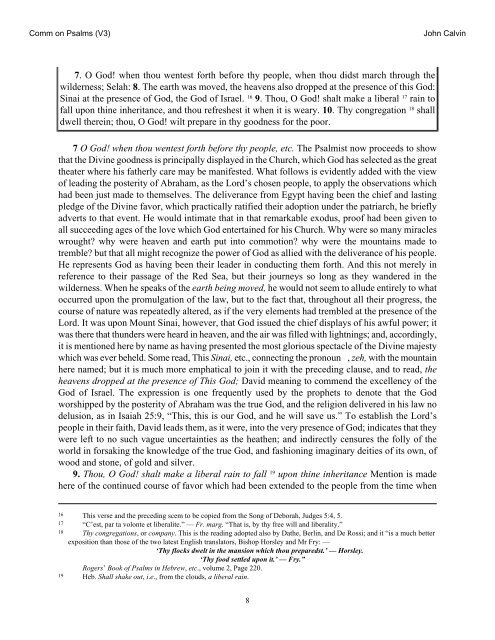Commentary on Psalms - Volume 3 - Bible Study Guides
Commentary on Psalms - Volume 3 - Bible Study Guides
Commentary on Psalms - Volume 3 - Bible Study Guides
- No tags were found...
Create successful ePaper yourself
Turn your PDF publications into a flip-book with our unique Google optimized e-Paper software.
Comm <strong>on</strong> <strong>Psalms</strong> (V3)John Calvin7. O God! when thou wentest forth before thy people, when thou didst march through thewilderness; Selah: 8. The earth was moved, the heavens also dropped at the presence of this God:Sinai at the presence of God, the God of Israel. 16 9. Thou, O God! shalt make a liberal 17 rain tofall up<strong>on</strong> thine inheritance, and thou refreshest it when it is weary. 10. Thy c<strong>on</strong>gregati<strong>on</strong> 18 shalldwell therein; thou, O God! wilt prepare in thy goodness for the poor.7 O God! when thou wentest forth before thy people, etc. The Psalmist now proceeds to showthat the Divine goodness is principally displayed in the Church, which God has selected as the greattheater where his fatherly care may be manifested. What follows is evidently added with the viewof leading the posterity of Abraham, as the Lord’s chosen people, to apply the observati<strong>on</strong>s whichhad been just made to themselves. The deliverance from Egypt having been the chief and lastingpledge of the Divine favor, which practically ratified their adopti<strong>on</strong> under the patriarch, he brieflyadverts to that event. He would intimate that in that remarkable exodus, proof had been given toall succeeding ages of the love which God entertained for his Church. Why were so many miracleswrought? why were heaven and earth put into commoti<strong>on</strong>? why were the mountains made totremble? but that all might recognize the power of God as allied with the deliverance of his people.He represents God as having been their leader in c<strong>on</strong>ducting them forth. And this not merely inreference to their passage of the Red Sea, but their journeys so l<strong>on</strong>g as they wandered in thewilderness. When he speaks of the earth being moved, he would not seem to allude entirely to whatoccurred up<strong>on</strong> the promulgati<strong>on</strong> of the law, but to the fact that, throughout all their progress, thecourse of nature was repeatedly altered, as if the very elements had trembled at the presence of theLord. It was up<strong>on</strong> Mount Sinai, however, that God issued the chief displays of his awful power; itwas there that thunders were heard in heaven, and the air was filled with lightnings; and, accordingly,it is menti<strong>on</strong>ed here by name as having presented the most glorious spectacle of the Divine majestywhich was ever beheld. Some read, This Sinai, etc., c<strong>on</strong>necting the pr<strong>on</strong>oun , zeh, with the mountainhere named; but it is much more emphatical to join it with the preceding clause, and to read, theheavens dropped at the presence of This God; David meaning to commend the excellency of theGod of Israel. The expressi<strong>on</strong> is <strong>on</strong>e frequently used by the prophets to denote that the Godworshipped by the posterity of Abraham was the true God, and the religi<strong>on</strong> delivered in his law nodelusi<strong>on</strong>, as in Isaiah 25:9, “This, this is our God, and he will save us.” To establish the Lord’speople in their faith, David leads them, as it were, into the very presence of God; indicates that theywere left to no such vague uncertainties as the heathen; and indirectly censures the folly of theworld in forsaking the knowledge of the true God, and fashi<strong>on</strong>ing imaginary deities of its own, ofwood and st<strong>on</strong>e, of gold and silver.9. Thou, O God! shalt make a liberal rain to fall 19 up<strong>on</strong> thine inheritance Menti<strong>on</strong> is madehere of the c<strong>on</strong>tinued course of favor which had been extended to the people from the time when16 This verse and the preceding scem to be copied from the S<strong>on</strong>g of Deborah, Judges 5:4, 5.17 “C’est, par ta vol<strong>on</strong>te et liberalite.” — Fr. marg. “That is, by thy free will and liberality.”18 Thy c<strong>on</strong>gregati<strong>on</strong>s, or company. This is the reading adopted also by Dathe, Berlin, and De Rossi; and it “is a much betterexpositi<strong>on</strong> than those of the two latest English translators, Bishop Horsley and Mr Fry: —‘Thy flocks dwelt in the mansi<strong>on</strong> which thou preparedst.’ — Horsley.‘Thy food settled up<strong>on</strong> it.’ — Fry.”Rogers’ Book of <strong>Psalms</strong> in Hebrew, etc., volume 2, Page 220.19 Heb. Shall shake out, i.e., from the clouds, a liberal rain.8
















